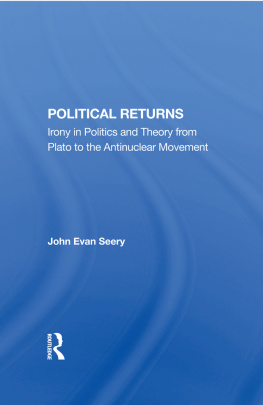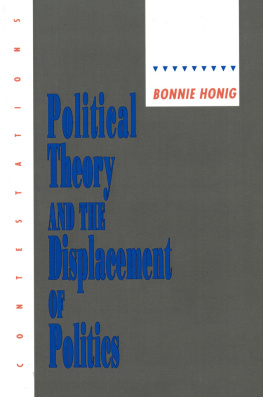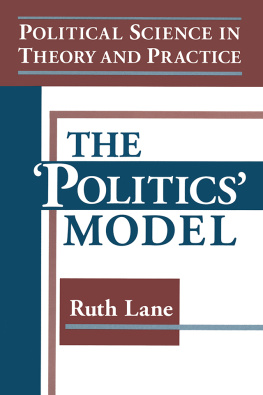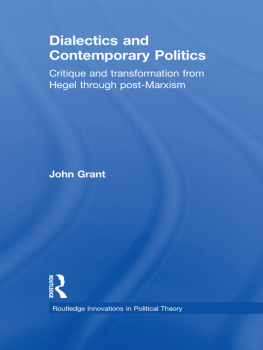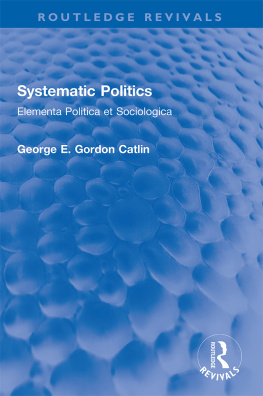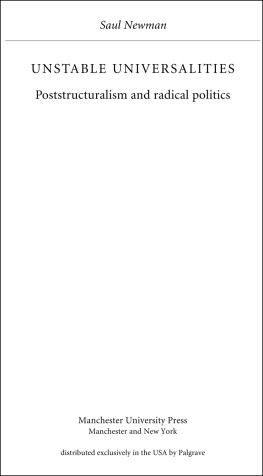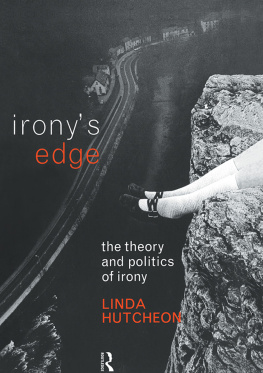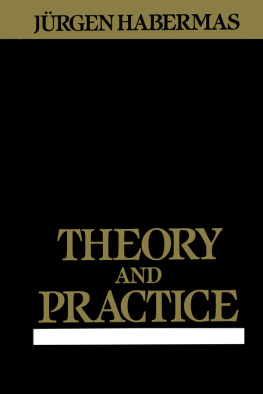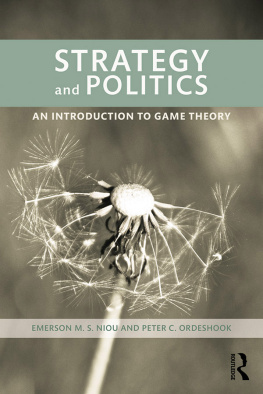POLITICAL RETURNS
Irony in Politics and Theory from Plato to the Antinuclear Movement
Political Returns
Irony in Politics and Theory from Plato to the Antinuclear Movement
John Evan Seery
First published 1990 by Westview Press, Inc.
Published 2019 by Routledge
52 Vanderbilt Avenue, New York, NY 10017
2 Park Square, Milton Park, Abingdon, Oxon OX14 4RN
Routledge is an imprint of the Taylor & Francis Group, an informa business
Copyright 1990 Taylor & Francis
All rights reserved. No part of this book may be reprinted or reproduced or utilised in any form or by any electronic, mechanical, or other means, now known or hereafter invented, including photocopying and recording, or in any information storage or retrieval system, without permission in writing from the publishers.
Notice:
Product or corporate names may be trademarks or registered trademarks, and are used only for identification and explanation without intent to infringe.
Library of Congress Cataloging in Publication Data
Seery, John Evan.
Political returns: irony in politics and theory from Plato to the antinuclear movement / by John Evan Seery.
p. cm.
ISBN 0-8133-7936-9.
ISBN 0-8133-7964-4 (if published as pbk.)
1. Political scienceHistory. 2. Antinuclear movement.
3. IronyPolitical aspects. I. Title.
JA81.S39 1990
320.5'09dc20 90-11989
CIP
ISBN 13: 978-0-367-28355-1 (hbk)
At a time like this, scorching irony, not convincing argument, is needed.
Frederick Douglass,
"What to the Slave Is the Fourth of July?"
Authors routinely want to use this semipublic space to express feelings of deep gratitude toward their friends, supporters, colleagues; and so do I. But last-minute doubts creep in: Maybe my coconspirators won't want to be named; a book hardly repays their generosity nor discharges my lifelong debts; maybe this whole exercise is presumptuously self-indulgent; maybe, for balance, I should say a few words about the people who weren't very helpful at all; and so on. If I proceed with this curious convention, I know that I will need to find the right combination of words warmly thanking these people for their wonderful contributions on the one hand, while relieving them of any lingering responsibilities on the other. Compounding all of these typical troubles is that I am attempting to thank my associates at the outset of a book on irony. Who will believe me? Is it too late for sincerity? How can I attach an acknowledgments page that isn't flip, glib, and self-protective? The enemies of irony shall cry, "Ahahe's turning earnest! We knew it couldn't last!" But I've been deadly serious throughout the writing of this entire book (more or less), and irony was consistent with that effort, providing far more than comic relief.
This book began as a dissertation at the University of California, Berkeley, which was about the only place in the world in the early 1980s that would have permitted a dissertation coupling irony and nuclear affairs. At the time, I felt myself fortunate to be there, and that sense has been only heightened in retrospect. Hanna Pitkin, my adviser, was never wildly enthusiastic about irony, but she stuck with me nonetheless, showing her care through hours upon hours of detailed, clearheaded (if perhaps secretly ambivalent) commentary and criticism. Her labors were pain staking, and my respec t grew into fondness into gratitude. Paul Thomas was present at every important juncture in my graduate career; it was he who first prompted me to write about nuclear politics, and then about Plato, and then about Marx. His inspiration and friendship sustain me to this day. Reinhard Bendix knew what I was doing before I did, and I always left his office begeistert and with a clearer sense of my ironic mission. I treasured my time spent with Reinhard and Jane Bendix and wouldn't trade those conversations for anything in the world. Also at Berkeley, John Traugott's quiet counsel gave me needed shots of confidence or kept me from going crazy, and Lowell Dittmer showed me a living example of how scholarship, decency, and understatement can all be combined. I also want to thank the Danforth Foundation and the Mabelle McLeod Lewis Foundation for their support during these graduate years.
An earlier version of the above committee, my professors at Amherst College--William Kennick, Tracy B. Strong, and George Kateb--set high standards, never patronized, and yet looked past students' youthful indiscretions, believing in possibilities. Such teachers change lives (albeit short of redemption), and these three taught me and still show me, through their words and in their persons, the integrity of the study of political theory and philosophy.
At Stanford University I met a true colleague and kindred spirit, Daniel Conway, whose ideas have energized and transformed my thinking, such that I'm no longer certain how to disentangle his thinking from mine, nor do I think it necessary. This book owes much to him. Also at Stanford, David Riggs proved to me that senior faculty members can actually talk to, take an interest in, and try to learn from junior faculty. I thank him for his encouragement.
Thanks as well to Spencer Carr, Marykay Scott, Marian Safran, Libby Barstow, Lynn Arts, and all others at Westview Press, whose professionalism made the task of publishing a first book an enjoyable experience.
Of course I want also to thank my overly proud parents, who never discouraged my waywardly cosmopolitan pretensions, though such tendencies took me away from the Midwest. Last, though I'm tempted to cite, in order to thank, numerous friends, relatives, former coworkers, classmates, colleagues, students, and ex-teammates on my softball team, I shall mention but three such persons, who must stand for the rest: Shey Tata, Bill Blagbome, and Kim Peasley. Without their companionship, all theory would be gray, indeed.
John Evan Seery
I recognize the tokens of the ancient flames.
--Vergil, The Aeneid --Dante, Purgatorio
Think how Christianity ruined hell for all of us. The early Christians--Peter and Paul were the primary culprits a concept the purpose of which could only be to bedevil, threaten, frighten, discipline, and deter us, but a concept whose conceptuality Peter and Paul would never dare confess. Eternal judgment became possible as never before, goodness and good rewards now separated geographically from evil, and clear-cut consequences to follow from an admittedly mysterious theology.
Why does it matter that hell has been perverted? Why not just thank the Christians for introducing an extreme, if compelling, form of utilitarian logic into the world and forgive them for their ghastly excesses? What has been lost or altered?
Much depends upon what hell, that entire experience of descending imaginatively into a nether region, once was. For unless we tour pre-Christian, Hellenic hell, we may miss a crucial and still abiding feature of Western morality and Western politics.
Who was Orpheus? He has been called the founder of many things: Orpheus, the founder of civilization, the harmonizer, the great initiate; Orpheus, the first poet, musician, and artist; Orpheus, the great lover, the first homosexual as well; Orpheus, the first go-between, the first reconciler, between life and death, between body and soul, and between Apollo and Dionysus. Who was this Odysseus before Odysseus, an Aeneas before Aeneas, a Christ before Christ, Dante before Dante, Faust before Faust, and Zarathustra before Zarathustra? Why has this tale endured and continued to entice?

